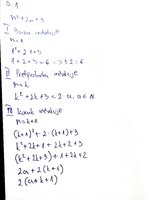You are using an out of date browser. It may not display this or other websites correctly.
You should upgrade or use an alternative browser.
You should upgrade or use an alternative browser.
Mathematical induction -Split -
- Thread starter lc312
- Start date
n^2+2n+3
Part 1.
n=1
1^2+2*1+3
1+2+3=6 =>3*2=6
Part 2.
n=k
k^2+2k+3=2*a, a ∈ ℕ
Part 3
n=k+1
(k+1)^2+2*(k+1)+3
k^2+2k+1+2k+2+3
(k^2+2k+3)+1+2k+2
2a+2*(k+1)
2*(a+k+1)
I dont know if this is the right solution but i would be verry grateful if you can help solv this issue.
I dont have any ideas anymore.
Many thanks.
Part 1.
n=1
1^2+2*1+3
1+2+3=6 =>3*2=6
Part 2.
n=k
k^2+2k+3=2*a, a ∈ ℕ
Part 3
n=k+1
(k+1)^2+2*(k+1)+3
k^2+2k+1+2k+2+3
(k^2+2k+3)+1+2k+2
2a+2*(k+1)
2*(a+k+1)
I dont know if this is the right solution but i would be verry grateful if you can help solv this issue.
I dont have any ideas anymore.
Many thanks.
HallsofIvy
Elite Member
- Joined
- Jan 27, 2012
- Messages
- 7,760
If I were your teacher I would ask for more "explanation"
1+ 2k+ 2= 2k+ 3 is odd and 1+ 2k+ 2+ 3= 2k+ 6= 2(k+ 3).
Therefore the statement is true for n= 1n^2+2n+3
Part 1.
n=1
1^2+2*1+3
1+2+3=6 =>3*2=6
Assume that forPart 2.
Then, forn=k
k^2+2k+3=2*a, a ∈ ℕ
Part 3
What happened to "+3"?n=k+1
(k+1)^2+2*(k+1)+3
k^2+2k+1+2k+2+3
(k^2+2k+3)+1+2k+2
Neither "1+ 2k+ 2" nor "1+ 2k+ 2+ 3" is equal to 2(k+1).2a+2*(k+1)
1+ 2k+ 2= 2k+ 3 is odd and 1+ 2k+ 2+ 3= 2k+ 6= 2(k+ 3).
No, it is 2(a+k+3)2*(a+k+1)
I dont know if this is the right solution but i would be verry grateful if you can help solv this issue.
I dont have any ideas anymore.
Many thanks.
D
Deleted member 4993
Guest
If "k" is an odd number - the next 'odd' number is "k +2"n^2+2n+3
Part 1.
n=1
1^2+2*1+3
1+2+3=6 =>3*2=6
Part 2.
n=k
k^2+2k+3=2*a, a ∈ ℕ
Part 3
n=k+1
(k+1)^2+2*(k+1)+3
k^2+2k+1+2k+2+3
(k^2+2k+3)+1+2k+2
2a+2*(k+1)
2*(a+k+1)
I dont know if this is the right solution but i would be verry grateful if you can help solv this issue.
I dont have any ideas anymore.
Many thanks.
so you need to check now:
(k+2)^2 + 2*(k+2) + 3
continue.....

